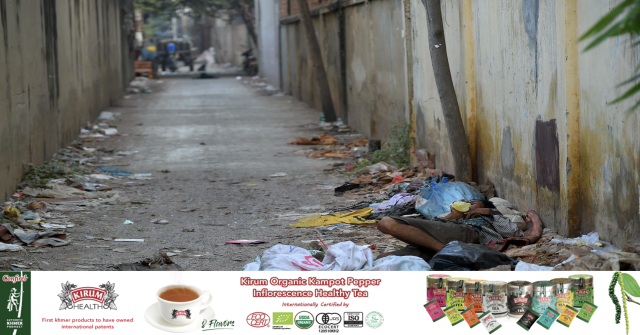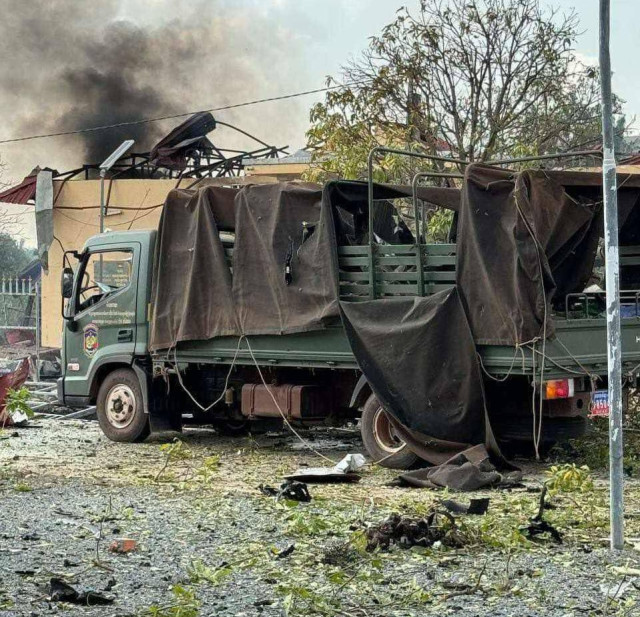How to Address Illicit Drug Use in Rural Cambodia: from a Police Officer’s Perspective

- By Nary Savath
- January 29, 2024 6:00 PM
I have penned this article as a follow-up to my previous article, which addressed the critical importance of childhood, especially early childhood, in determining the resultant adult person. Of great concern to most people must be the negative factors that surround drug taking and the consequences of this for our society.
We should all be aware that there are legal drugs and illegal drugs. Legal drugs that adversely affect us tend to be treated as legal as they have become socially acceptable over time. Two of the most apparent legal drugs are tobacco and alcohol.
If either of these were to be introduced now, if they had not existed before, they would be promptly banned. The United States tried to ban alcohol during the prohibition era, which lasted from 1920 until 1933. This attempted prohibition was a spectacular failure and just gave rise to lots of illegal activities and gangsters making a lot of money. The underlying problem is that alcohol use has become normalized and part of society recreation.
The data from the U.S. is as follows: Tobacco is responsible for costing the United States billions of dollars yearly and over 480,000 deaths in recent years, and alcohol is responsible for 88,000 deaths annually. This is above the level of other drugs, both (abused) prescriptions and illegal drugs.
The problem with these legal and illegal drugs is that they are addictive, and steps need to be taken to stop them from being used in our society. "Peer pressure" has a lot to answer for. Peer pressure can be defined as when you do something because you want to feel accepted and valued by your friends.
Peer influence can be positive or negative. Coping well with peer influence is about getting the right balance between being yourself and fitting in with your group. A person with a joyous childhood will be self-assured and able to make good decisions and will not be easily affected by negative peer pressure. A self-assured person has a clear view of his (or her) identity and is comfortable with the sort of person he feels he is.
A person who perhaps has had a damaging childhood often is desperate to want to "fit in" and be "accepted" by his peers—he will try and modify who he is to "fit in”—and if his peers happen to be the wrong sort of peers, then it is certain that this person will go down the wrong path. A self-assured young person will be better able to choose the right sort of people to be with and identify with.
Parents of teenage children face the most challenging times as their little child transforms into an adult. Unfortunately, the physical changes often happen faster than the mental maturity of the young adult.
So, what should a parent do if they are rightly concerned about their children going down the wrong path?
I can use a well-used word: education. Gently explain to your children as they grow up, maybe from quite a young age, the dangerous and foolish things some adults do. Of course, this will have minimal credibility if you are doing those things yourself, such as excessive drinking or smoking. If there are adults in your family who suffer from these issues, the best you can do is to try and point out the damage this causes.
The other important factor is to teach your children to be able to discuss ANYTHING with you. For a child to do this with a parent, the child must be confident that the parent will not judge or think badly of that child if the child discloses something less than good.
So, if your child disclosed to you or you became aware of something negative your child has done, the last thing you should do is to punish them, especially by hitting them. You must ask the child to sit down and "let’s talk this through." Allow the child to explain WHY they did what they did, then discuss what can be done to put matters right. Then, when you have reached a reasonable conclusion, the discussion can be on a loving note, maybe by stating to the child that you love him/her and thanking the child for being honest with you. Then, as your children grow older, they will always know they can discuss anything with you without fear of your adverse reaction.
Of course, most childhoods don't work out so well for all sorts of reasons. Many parents feel they could have done a better job if they had another chance at being a parent. Unfortunately, there is little support for parents on how to be good parents and cope with the hard times. So, it is pointless to "beat yourself up" if you feel you have failed. No parent can be a perfect parent. If your child has turned to drugs, it is no good looking into the past; you must deal with the situation you are presented with now. Generally, more comprehensive family support will be constructive for those who can manage this. However, in a fragmented society, this is less and less common.
Some signs to look for that your child might be taking drugs are as follows. First, your child or children can not appear to be attentive and aware of what is going on around them. And a change in peer group could be significant, which is why it is essential to try and be mindful of the peer group your child hangs around with. Tactfully, as a parent, you must try and inquire how they are, where they have been and what they have been up to. If you are asking too many questions, then you risk breaking any chance of good communication, so a very delicate balance is required. If they are very mysterious, then you should look for the other signs of drug use.
Teenagers go through massive changes as they become adults. Moodiness by itself might not be a sign of drug taking. But perhaps if they are jittery in the morning but calm in the evening, after maybe they have taken drugs, then this could help you confirm that drug-taking has taken place. Or forgetfulness, poor memory, which used to be acceptable in previous times.
You may also notice unexplained injuries, but also be aware that injuries could be because of bullying. You may see that your valuable things or money go missing but be very careful before you accuse your child, or you will set up a horrible situation between you and your child if you happen to be wrong. Other signs could be weight changes, particularly sudden weight loss. They may appear to drop previous interests, like suddenly stopping a sporting activity that your child previously enjoyed. They can be staying out late without giving a reasonable explanation.
If you have the good fortune of having "adult-like" discussions with your child(ren), then you can point out the dangers of all drugs, not just the illegal ones. In terms of some of the illicit drugs, even marijuana, which is legalized in many countries, even in Thailand, the critical point to make is that a child's brain does not fully mature until something like the age of 25. So, before this age, the brain can be very negatively affected by some drugs, which can often lead to schizophrenia.
Schizophrenia can be defined as a severe mental disorder in which people interpret reality abnormally. Schizophrenia may result in some combination of hallucinations, delusions, and extremely disordered thinking and behavior that impair daily functioning and can be disabling. There is no known cure for schizophrenia. The best and only option is medication, which can help keep the symptoms at bay.
We should all consider that young people must express themselves and explore their capabilities. They must be given opportunities to do so, and not just always telling a child or person what "not to do" and never offering a better alternative, which is achieving nothing other than perhaps antagonism in a young person.
The police takes illegal drug activities very seriously, as should all of our society.
Recent information that has come to my attention is that, even in a sleepy town like Anlong Veng, there is a high incidence of drug taking in the 13-to-23-year-old age bracket. Worse still, this seems to be the cause of a resurgence in HIV (AIDS) patients, most likely exacerbated by sharing dirty needles or young people perhaps prostituting themselves to pay for their habit.
In truth, these young people are victims, and they desperately need help. A program for the supply of free needles has shown to be positive in the reduction of the spread of diseases such as HIV in the drug-taking population.
We should consider hitting this problem head-on with forms of actions as suggested below:
1. We need to provide support and education to these young people as well as try to research the underlying reasons why young people in Cambodia are turning to drugs.
2. We must take all possible steps to curtail the supply of drugs, particularly by catching the dealers. Stripping them of all the financial benefits they have gotten from the drug trade and placing them in prison for a long time is a clear message to anyone else thinking they can make some easy money from being a drug dealer.
3. We need to educate the target (youth) buyers, especially in schools and all educational institutions, about the effects of drug use and the severe punishment of perpetrators.
4. Separating drug traffickers and drug addicts in jails, and establishing drug rehabilitation centers in the capital and the provinces throughout the country.
5. Distributing contact information (phone numbers, etc.) of law enforcement officers to people throughout the country so that people can easily reach them in time.
6. Implementing the 3-don’ts and the 1-report: do not get involved, do not intervene, do not exempt, and report
You can help the police to catch these criminals. You can provide information by calling 117—anonymously—so we, the police, can take the appropriate investigative steps.
Only as a society can we stamp out the scourge of drug taking and drug addiction.
Sovath Nary is a police officer at the Preah Vihear Police Station and a single mother of a 6-year-old daughter.















